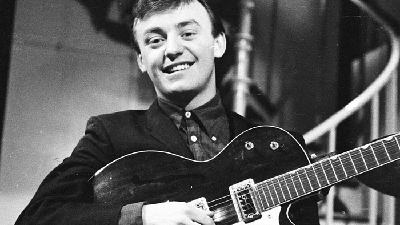published: 14 /
2 /
2021

Nick Dent-Robinson reflects on the career of Gerry Marsden, the frontman of the record-breaking 1960s Mersey Sound band, Gerry and the Pacemakers, who died in January.
Article
Gerry Marsden, frontman of the record-breaking 1960s Mersey Sound band, Gerry and the Pacemakers, died on 3 January at the age of 78.
He had suffered heart problems for some years, and used to joke with grim irony that he'd become Gerry and The Pacemaker after having a pacemaker fitted during cardiac surgery in 2003 and again in 2016.
Gerry had, like The Beatles, grown up in post-war Liverpool. He started a skiffle group around the same time that John Lennon formed The Quarrymen with Paul McCartney, and both groups played the same venues around Merseyside. Gerry and his band also travelled to Hamburg and performed there – just as The Beatles did.
Gerry and The Pacemakers were the second band (after The Beatles) to be signed by Brian Epstein and their records were also produced by George Martin. Gerry's first hit, ‘How Do You Do It?’, was intended to be recorded by The Beatles as their first single, but they rejected the song in favour of their own composition, “Love Me Do”. They were incensed when ‘How Do You Do It?’ - written by Mitch Murray - immediately went to Number One while ‘Love Me Do’ only reached 17 in the UK singles chart.
In 1963 Gerry and The Pacemakers went on to become the first act in chart history to achieve a number one with their first three singles. ‘I Like It’
and Gerry's very original version of Rodgers and Hammerstein's ‘You'll Never Walk Alone’ both achieved massive sales and each remained at Number One for some time. Indeed, this third Number One single went on to become the anthem of Liverpool FC, and continues to be played over the Anfield PA system before every Liverpool home match.
During 1963, The Beatles, Gerry and The Pacemakers and Roy Orbison undertook a lightning tour of the UK. As their reputations grew, the tour rapidly sold out and the culmination was a concert at the Romford Odeon in Essex where Roy Orbison's place was taken by a third Epstein-managed Liverpool band, Billy J Kramer and the Dakotas, who were by now at Number Three with their version of Lennon and McCartney's ‘Do You Want to Know A Secret?’ The concert was billed as the ultimate ‘Merseybeat Showcase’.
Of course, over time, The Beatles left Gerry and The Pacemakers trailing in their wake. But Gerry and his group enjoyed further hits with ‘Don't Let the Sun Catch You Crying’ and ‘Ferry Cross the Mersey’. Both songs were part written by Gerry and the latter became the theme tune of the 1965 film of the same name, which starred Gerry and The Pacemakers as well as Liverpudlian singer Cilla Black.
Subsequently, the group - which included Gerry's older brother Freddie on drums - broke up and Gerry moved on to the West End stage, appearing for four years in the lead role in ‘Charlie Girl’. He did a lot of television and by the mid-Seventies when nostalgia for the Sixties was already setting in, Gerry revived The Pacemakers and undertook a tour of the USA with Herman's Hermits, Billy J Kramer and The Searchers. This was billed as ‘The British Re-Invasion Show’ and culminated in a sell-out concert at New York's Madison Square Garden.
Years of cabaret performances followed with lucrative appearances on the nostalgia circuit in the UK, Europe and the USA. There were many charity appearances too, including a re-recording of ‘You'll Never Walk Alone’ with Paul McCartney, Holly Johnson of Frankie Goes To Hollywood and others after the Hillsborough stadium disaster. This gave Gerry his fifth UK Number One, a quarter of a century after the song had first been a hit. It also raised many millions of pounds for Hillsborough victims.
Subsequently Gerry's poor health limited his public appearances, although he did appear briefly with Take That at Anfield in 2019 to sing “You'll Never Walk Alone” in celebration of Liverpool winning the Champions League.
Gerry was happily married for over 55 years to Pauline (née Behan) who was the former girlfriend of George Harrison. George would tell the story of returning from Hamburg, where the Beatles had been away working for several months, to be told by Gerry when they met in Liverpool's Cavern Club, “I've got some good news and some bad news, George. The good news is I am in love. The bad news is that it's your girl.” George took this in his stride, however, and was very happy for the couple when they married a few years later. He would no doubt agree with Paul McCartney's tribute to Gerry. “His unforgettable performances of 'You'll Never Walk Alone' and 'Ferry Cross the Mersey' will always remain in people's hearts as reminders of a joyful time in British music. He was our biggest rival in The Beatles' early days and we all admired him. I pass love and sympathy to Gerry's wife Pauline and their family...I will always remember Gerry with a smile.”
Band Links:-
https://en.wikipedia.org/wiki/Gerry_Ma
Play in YouTube:-